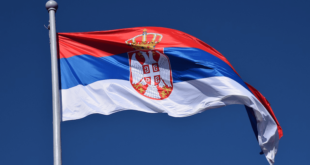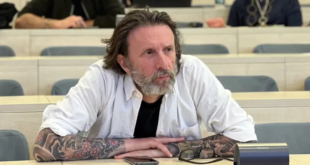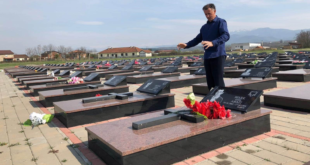The US administration has imposed sanctions on several Bosnian officials and a TV station for alleged corruption and for trying to destabilise Bosnia and Herzegovina, but experts said these measures alone might not do much to ease the country’s political crisis.
Bosnian Serb political leader Milorad Dodik, his adviser and former president of Bosnia’s High Judicial and Prosecutorial Council, Milan Tegeltija, as well as their affiliated TV station Alternativna Televizija, topped the list of latest US sanctions against allegedly corrupt and destabilising Bosnian officials.
The sanctions, announced on Wednesday by the US Treasury and Secretary of State Antony Blinken, also include Tegeltija’s spouse Tijana Tegeltija, as well as Mirsad Kukic, a Bosniak politician who is a member of the state parliament, a former member of the ruling Bosniak Party of Democratic Action, SDA, now the president of the Movement for Democratic Action, PDA.
The sanctions mean that they are all banned from travelling to the US, and any assets they have in the US are frozen. Dodik and Milan Tegeltija have publicly rejected the US allegations but there has been no statement from Tijana Tegeltija or Kukic so far.
While the sanctions may not have a major direct impact on Dodik, the Tegeltijas and Kukic – who have not been travelling to the US for a while and have no known property there – they may have a serious effect on tycoons linked with them, Bosnian and US officials said.
Several US sources told BIRN that more sanctions will follow against Balkan politicians and tycoons in the upcoming period.
“Other leaders and entities linked to corrupt or destabilising actors may also be subject to future actions by the US government,” Blinken said in his announcement.
He added that US sanctions “reaffirm the US commitment to the sovereignty and territorial integrity of Bosnia and Herzegovina, the rule of law and democratic institutions, and a better future for Bosnia and Herzegovina’s citizens.”
Some local and international officials and experts said that the sanctions should be part of much broader, better targeted and coordinated US and EU efforts, or they may have negative effects on the deepening crisis in Bosnia and the rest of the Balkans.
However, the EU remains deeply divided over the possibility of sanctions against Balkan officials. Some EU member countries, like Germany, are pondering the imposition of unilateral economic sanctions.
Dodik, the main target
There is no doubt that the main target of Wednesday’s new US sanctions is Milorad Dodik, the Serb member of Bosnia’s tripartite presidency and the leader of the ruling Bosnian Serb party, the Alliance of Independent Social Democrats, SNSD. Dodik was first sanctioned by the US in January 2017, and it is not clear whether or how will this new announcement intensifies the sanctions imposed upon him.
Dodik, originally an American protégé, has been the main instigator of political crisis in Bosnia for several years. In July 2021 he initiated a boycott of all state institutions by all Bosnian Serb political parties, after the senior international official in the country at the time, High Representative Valentin Inzko, imposed legislation banning the denial of genocide. Bonsian Serb political leaders refuse to accept that the 1995 massacres of Bosniaks from Srebrenica constituted genocide.
In October, Dodik went even further when he launched an initiative for the withdrawal of Bosnia’s Serb-dominated entity of Republika Srpska from all state institutions established after the Dayton agreement that ended the Bosnian war in 1995.
His initiative – seen by many as a precursor to Republika Srpska’s secession from the rest of Bosnia – was approved by the Republika Srpska National Assembly on December 10, and the Republika Srpska government was tasked with preparing the paperwork for its implementation within the next six months.
According to Wednesday’s announcement by the US Treasury’s Office of Foreign Assets Control, sanctions were imposed on Dodik because of his “corrupt activities and continued threats to the stability and territorial integrity of Bosnia and Herzegovina.”
Besides Dodik’s efforts to destabilise Bosnia’s constitutional order, he was also sanctioned for corruption, the US Treasury statement said.
“He has established a patronage network in Bosnia and Herzegovina, from which he and his associates benefit. As one example of his corrupt actions, Dodik has provided government contracts and monopolies in the Republika Srpska directly to close business associates. With his corrupt proceeds, Dodik has engaged in bribery and additional corrupt activities to further his personal interests at the expense of citizens in the RS [Republika Srpska],” it added.
Besides Dodik, sanctions were imposed on his adviser Milan Tegeltija, who is former president of Bosnia’s judicial overseer, the High Judicial and Prosecutorial Council, as well as their affiliated TV station Alternativna Televizija, ATV.
ATV and Tegeltija, Dodik’s ‘enablers’
ATV was one of the leading independent TV stations in Republika Srpska until 2019, when some of its stakeholders sold their shares to the company Grand Trade, owned by Mile Radisic, a Bosnian Serb tycoon known to be close to Dodik.
After that, its editorial policy changed soit became one of the staunchest supporters of Dodik. The takeover of the TV station was finalised last year, when the company Prointer ITSS – known to be close to Dodik’s son Igor – acquired a company called K-2 and with it the majority of ATV’s shares.
The US Treasury statement said that ATV “is privately owned by a company closely linked to Dodik’s family”, adding that “Dodik himself exerts personal control over ATV behind the scenes, such as by requiring personal approval on media stories related to politically sensitive topics.”
“Dodik acquired ATV to deliberately and expressly further his own agenda, which includes his efforts to denigrate other political figures, burnish his public image, and advance his own personal and political goals,” the statement added.
It also claimed that “Dodik has awarded ATV-related contracts directly to members of his family, which he has used as yet another avenue for corruption”, and alleged that Dodik “has funnelled money directly from public companies to ATV for corrupt purposes.”
The US Treasury’s Office of Foreign Assets Control alleged that in his official capacity as president of the High Judicial and Prosecutorial Council, Tegeltija was “involved in corrupt acts that included using his political influence and official power for his personal benefit.”
“There is credible information that Tegeltija used his position to solicit a benefit in return for interfering in a judicial process as well as manipulating judicial appointments and other public employment,” it added.
As for Kukic, the Office of Foreign Assets Control stated that “in his official capacity as a manager of the publicly owned Banovici mine and as a Parliamentary Assembly Representative, Kukic was involved in corrupt acts that used his political influence and official power for his personal benefit.”
“Specifically, there is credible information Kukic misappropriated public funds for personal benefit and interfered in hiring and appointment decisions to benefit himself politically,” it claimed.
Dodik hits back at sanctions
In his first reactions to the new sanctions, Dodik insisted he did not know why he was being targeted.
“I was not elected to represent American interests but those of the Serb people,” he told media in Banja Luka.
He also noted that the US, “as a country that boasts of human rights and media freedoms”, hasalso sanctioned a media organization, ATV.
“If they [the US authorities] think that they will discipline me this way, they are badly mistaken. Now I have got new motive to fight for the rights they have been taking away from us for 26 years [since the end of the Bosnian war],” he said.
Milan Tegeltija said that the sanctions imposed on him and his wife have no judicial basis and represent “political pressure” from a foreign country.
“I have no need to defend myself, it’s meaningless, because these sanctions are not the result of some court proceedings,” Tegeltija told news agency Srna.
While the sanctions were welcomed by Bosniak politicians and media, other officials and experts were less optimistic about the impact that the measures will have on Bosnia’s deepening crisis.
“The key question is where is this country heading and where is the exit from this crisis,” said Mladen Ivanic, a retired Bosnian Serb opposition leader who was one of Dodik’s biggest opponents for many years.
He also stressed that the timing of the sanctions, so close to Orthodox Christmas, was not good, and that they will only have positive impact if other corrupt politicians from Bosnia’s other entity, predominately Bosniak and Croat-populated Federation, are also soon placed on the US sanctions list.
Banja Luka-based political analyst Tanja Topic told BIRN that the sanctions have been expected “for a long time”.
Topic added that although Dodik called the sanctions “meaningless”, he is concerned, which was made clear by the fact that he has already called for a meeting of his SNSD party’s leadership to discuss the situation.
“Part of the Republika Srpska public will celebrate Dodik because ‘little Dodik was attacked by a powerful force’, while others will call for the prosecution of all those involved in corruption. Serbs love victims but are also against corruption,” she said.
But if the sanctions are not widened to include other allegedly corrupt figures, they will harden ethnically-based positions, she concluded.
“These sanctions will have an effect only if they are accompanied by sanctions from some European countries, and if they include other Serb, Croat and Bosniak politicians,” she said.
 Eurasia Press & News
Eurasia Press & News



